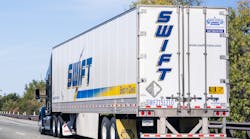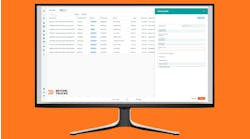Knight-Swift Transportation President and CEO Dave Jackson is ready to pounce.
Speaking to analysts and investors after his team reported disappointing third-quarter results and lowered its forecasts, Jackson devoted a large share of his comments to talking about the large carrier's plans to acquire a range of businesses.
Knight-Swift, which is No. 4 on the FleetOwner 500: Top For-Hire Fleets of 2022 list, is itself the product of a large merger in 2017 and in recent years has made a number of acquisitions, most notably paying $1.35 billion for AAA Cooper last year to get into the less-than-truckload market. The company followed up that acquisition with a $150 million deal for the parent company of Midwest Motor Express (No. 232 on the FleetOwner 500 for-hire list) and Midnite Express. The work of knitting together those organizations while preserving their brands is nearly complete, Jackson said on Oct. 19, setting the stage for further deals to grow Knight-Swift's super-regional LTL network.
See also: Knight-Swift strikes another LTL deal
“We feel like there's a lot of individuals that have watched us closely [and] are probably watching us closely,” Jackson said. “So we feel like we're somewhat auditioning, if you will, for others that we've had conversations with. That's all underway, and I feel like we're making some headway.”
While LTL is a natural area for Knight-Swift to put to work its war chest, Jackson added that truckload and various complimentary businesses also are of interest to the Phoenix-based company. If anything, Jackson said, the deteriorating truck market conditions and the stress that’s putting on many businesses—CFO Adam Miller noted that data from the U.S. Bureau of Labor Statistics showed truck employment fell by more than 11,000 in September—have stoked his appetite.
“We can be a source of capital and solve some issues for individuals that are looking for what's next for their business,” Jackson said. “We may be overdue for some truckload business, and there is no shortage of truckload businesses out there.”
Jackson’s ambitions stood in some contrast to the third-quarter results Knight-Swift reported and the lower outlook he and his team gave investors for the rest of the year because they expect a “muted” peak season, less spot-market business and continued cost pressures. In the three months ended Sept. 30, Knight-Swift produced a net profit of $195 million versus $206 million in the prior-year period, even though revenues (excluding fuel surcharges) rose more than 9% to $1.65 billion. Operating profits were down slightly to $265 million.
See also: Knight-Swift execs sticking to strong rate growth forecast
The company’s truckload segment, which still accounts for nearly 60% of the company’s revenues, saw operating income slide 15% year-over-year as rising driver, equipment, maintenance, and insurance costs outweighed an increase in revenue per tractor of nearly 2%. As a result, the segment’s adjusted operating ratio rose to 81.8% for the quarter.
Jackson and his lieutenants said truckload freight demand was below where it usually trends for a large part of the third quarter and hasn’t rebounded this month. A number of customers, they said, have higher inventories heading into the holiday season, which is resulting in “much more orderly” transportation season.
“It feels like there's some catch-up going on and it appears that our customers […] definitely don't have the level of project business that we had last year,” Jackson said. “But the reasons for that to be off the way that it is doesn't hold true as you move into next year. I would be careful to try and extrapolate or read through what you see for fourth quarter in the first and second.”
Shares of Knight-Swift (Ticker: KNX) fell nearly 6% to $46.50 on Oct. 20. They are also down about that much over the past six months.
Knight-Swift started 2022 reporting better results. The FleetOwner 500 company posted profit growth of more than 60% in the first quarter, which executives said ended with plenty of momentum for further improvements. The company grew its total first-quarter revenues 49% from a year earlier to nearly $1.83 billion. (Excluding fuel surcharges, growth was 45%.) An improved adjusted operating ratio of 80.6% versus 84.5% in early 2021—the truckload segment’s ratio dipped to 78.2% during Q1—helped net profits soar to $208 million.




